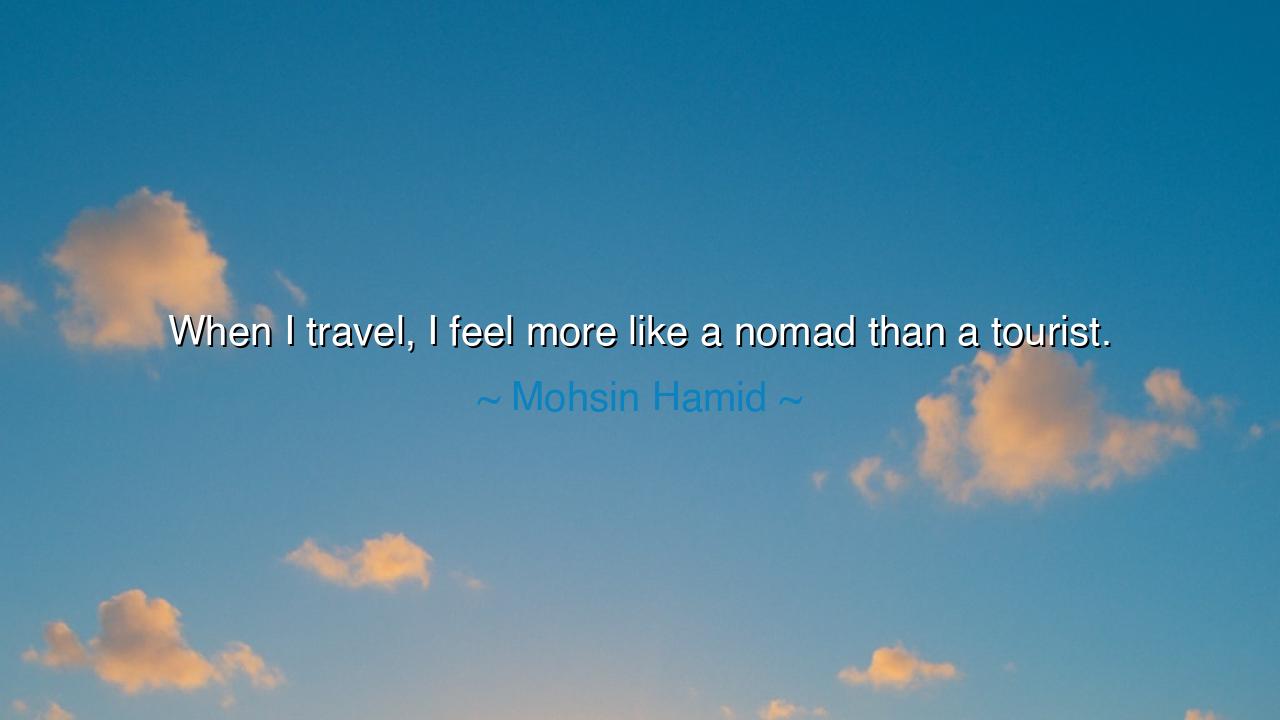
When I travel, I feel more like a nomad than a tourist.






In the words of Mohsin Hamid: “When I travel, I feel more like a nomad than a tourist.” At first, these words seem but a reflection on the style of movement, yet beneath them lies a deeper wisdom about how one encounters the world. To be a tourist is to skim the surface, to glance upon monuments, to pass through lands without truly belonging. But to be a nomad is to surrender oneself to the journey, to carry no fixed center but to find home wherever the road leads. In this distinction lies the ancient call to live not as a consumer of places, but as one woven into the fabric of the earth.
The origin of these words is old, older than the cities and the stone temples of man. For the first humans were nomads, wandering across deserts, plains, and forests, living lightly upon the land, tied not to stone walls but to the eternal rhythms of the sky and the soil. The nomad did not gaze upon the world as spectacle, but as life itself. He did not ask, “What can this place give me in memory or photograph?” but rather, “How do I live here, breathe here, belong here?” To feel like a nomad, then, is to awaken an ancestral memory deep in the bones, to step into the wisdom of those who understood that life is not a possession, but a passage.
History tells us of peoples like the Bedouins of Arabia, who roamed the sands with their tents and herds, their identity not in fixed palaces but in the strength of kinship and tradition. Or the Mongols, who moved with their horses across the steppes, shaping empires not by building walls but by flowing like wind across vast horizons. These peoples knew that the world could not be “visited” as a tourist visits; it could only be inhabited, even if for a brief time, as a nomad inhabits—present, adaptive, and alive.
Hamid’s words also speak to the soul’s posture in travel. The tourist remains a stranger, always apart, insulated by comfort, guided by schedules and maps. The nomad, by contrast, embraces discomfort, learns the language of the land, eats of its bread, and listens to the voices of its people. The tourist takes; the nomad participates. The tourist seeks escape; the nomad seeks connection. Thus, Hamid reminds us that true travel is not an escape from self, but a return to the primal truth of being a wanderer in a vast and mysterious world.
There is also a spiritual dimension here. In every tradition, the pilgrim is honored above the idle traveler. The pilgrim journeys not for novelty but for transformation. When Hamid says he feels like a nomad, he aligns with this ancient archetype—the seeker whose path is both outward and inward. The roads he walks are not only through cities and deserts, but through the heart’s own terrain. For the nomad of spirit learns not only new lands but new ways of seeing, of belonging, of being human.
The lesson, then, is profound: do not travel merely to consume the world. Travel to belong, however briefly. Walk not as one who comes to take a picture, but as one who comes to listen, to learn, and to live in rhythm with the land. Even if your stay is short, let it be deep. Eat with those who dwell there. Learn their names, their stories, their songs. For in that moment, you cease to be a tourist—you become kin, a fellow wanderer upon this shared earth.
In practice, cultivate the spirit of the nomad in all your journeys. Pack lightly, not only in luggage but in expectation. Leave room for the unexpected, for the unplanned encounter, for the silence of a new horizon. Approach each place not as an exhibit to be viewed but as a world to be entered with reverence. In doing so, you will discover that travel is not a hobby, but a way of awakening—an ancient rhythm echoing in modern times.
Thus, Hamid’s words are not merely about travel; they are about life itself. Be a nomad, not a tourist. Move through this world with openness, with humility, with the willingness to be shaped by what you encounter. For life, too, is a journey without a fixed center, a road that winds through landscapes of joy and sorrow. And those who walk it like nomads—present, connected, and unafraid—are the ones who truly arrive.






AAdministratorAdministrator
Welcome, honored guests. Please leave a comment, we will respond soon